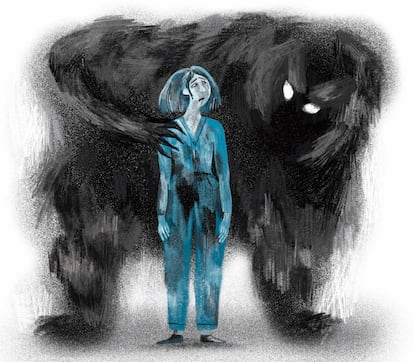Why do we feel scared?
It is the emotion that limits us the most, but also vital for survival. It seems logical to us that death scares us, but the small fears of everyday life baffle us

All of us have felt fear. It is a universal emotion, and we will never be able to get rid of it. But what is hidden behind fear? In some cases, it seems obvious: death, illness or not making ends meet. But it can also be more subtle. Fear can appear suddenly, and sometimes it can be disconcerting, as with our worries about what to say or anxiety about making a mistake. Fear is our most limiting emotion. It is the one that most hurts us, but at the same time, it is the most important to our survival. Knowing what sparks our fears can give us valuable information to know ourselves better and act accordingly.
Greek and Roman mythology offer us an interesting clue. According to myth, fear is the son of Venus, the goddess of love, and Mars, the god of war. Fear, according to that metaphor, is born of love or attachment. That is, we are afraid of what we want and do not want to lose. It is not, therefore, surprising that one of our greatest shared fears is death, and that the people with nothing to lose can be the most dangerous.
Fear is a way of protecting our basic needs. The main need is survival, which can manifest in different ways. Michael Pirson, a professor at Fordham University in New York, explains in his book Humanistic Management (Cambridge University Press, 2017) the different types of essential needs we have. Two of them are directly linked to physical survival: the need to acquire what we need to live, such as food and shelter, and the need to defend ourselves from danger. Uncertain times, a potential layoff or a smarter coworker threatening our position in the company can trigger our most primitive anxieties.
In addition to the above, Dr. Pirson recognizes two other needs: belonging and understanding. “Belonging is still linked to survival,” he writes. We would not have been able to reach adulthood if we had not been taken care of as children. We are born as vulnerable mammals, and we need to feel the affection of those around us to survive. That need results in other, more subtle fears.
Behind a possible failure or the fear of what others will say is the need to feel loved and to protect our self-esteem. That possibility awakens in us the fear of ceasing to belong and of being excluded. Speaking in public, being vulnerable or the possibility of losing influence in our personal or professional circle can also spark those fears.
We know that our survival does not depend on screwing up in public, but the unconscious responses to this emotion are very primitive. This is how author Elsa Punset sums it up: “Our brain, programmed to survive, exaggerates fear and tends to see threats and dangers where there are none. The brain does not care about you being happy or creative. It cares, above all, about you staying alive.” All of us, even if we’re not aware of it, interpret emotional survival in our own way.
Finally, another basic need is understanding: for what we do to make sense, and to continue learning and advancing. In environments where we lack purpose or are stagnant, Dr. Pirson says, a threat, and its associated fear, can be awakened.
To learn to reconcile with our fear, we need to understand what is hidden behind our unconscious responses. Recognizing the subtle link with our need for survival, belonging, understanding and development helps us to take a new perspective. We are not going to live without fear. It will always accompany us. But we can learn to prevent it from dominating our decisions and our everyday lives.
Pilar Jericó is the author of the Laboratorio de Felicidad (Lab of happiness) blog.
Sign up for our weekly newsletter to get more English-language news coverage from EL PAÍS USA Edition
Tu suscripción se está usando en otro dispositivo
¿Quieres añadir otro usuario a tu suscripción?
Si continúas leyendo en este dispositivo, no se podrá leer en el otro.
FlechaTu suscripción se está usando en otro dispositivo y solo puedes acceder a EL PAÍS desde un dispositivo a la vez.
Si quieres compartir tu cuenta, cambia tu suscripción a la modalidad Premium, así podrás añadir otro usuario. Cada uno accederá con su propia cuenta de email, lo que os permitirá personalizar vuestra experiencia en EL PAÍS.
¿Tienes una suscripción de empresa? Accede aquí para contratar más cuentas.
En el caso de no saber quién está usando tu cuenta, te recomendamos cambiar tu contraseña aquí.
Si decides continuar compartiendo tu cuenta, este mensaje se mostrará en tu dispositivo y en el de la otra persona que está usando tu cuenta de forma indefinida, afectando a tu experiencia de lectura. Puedes consultar aquí los términos y condiciones de la suscripción digital.








































